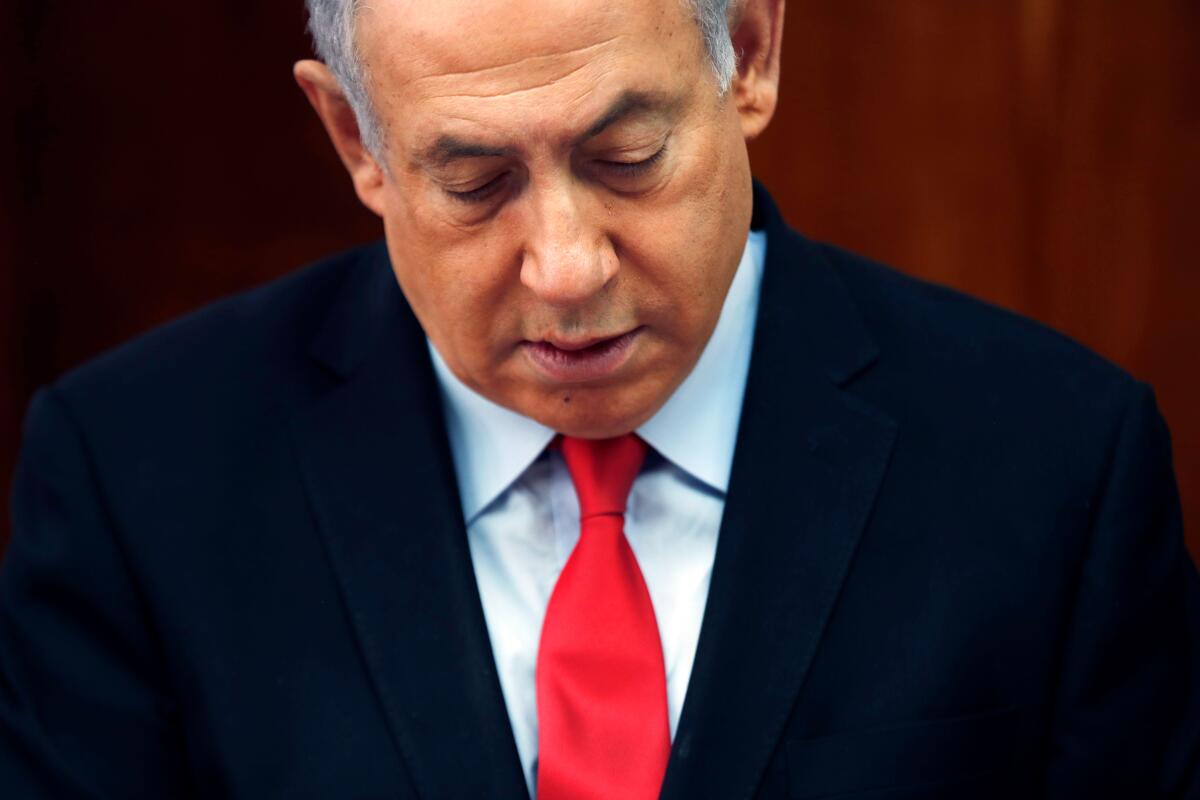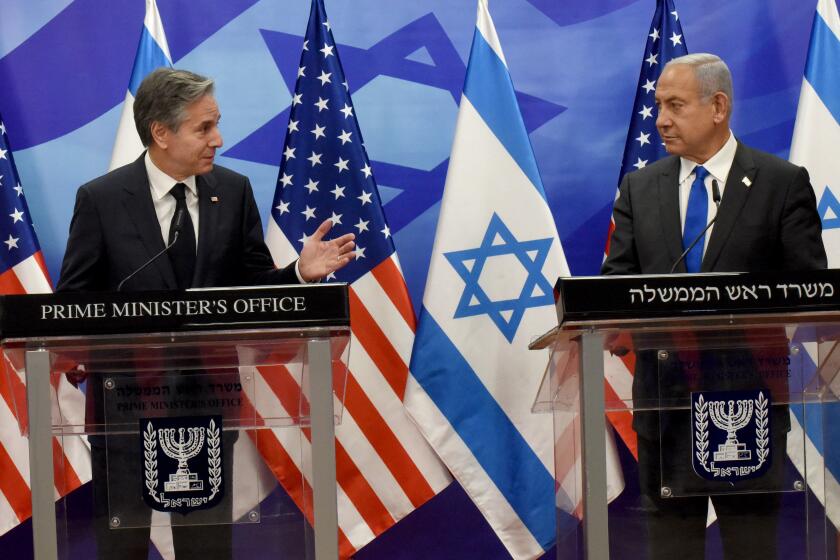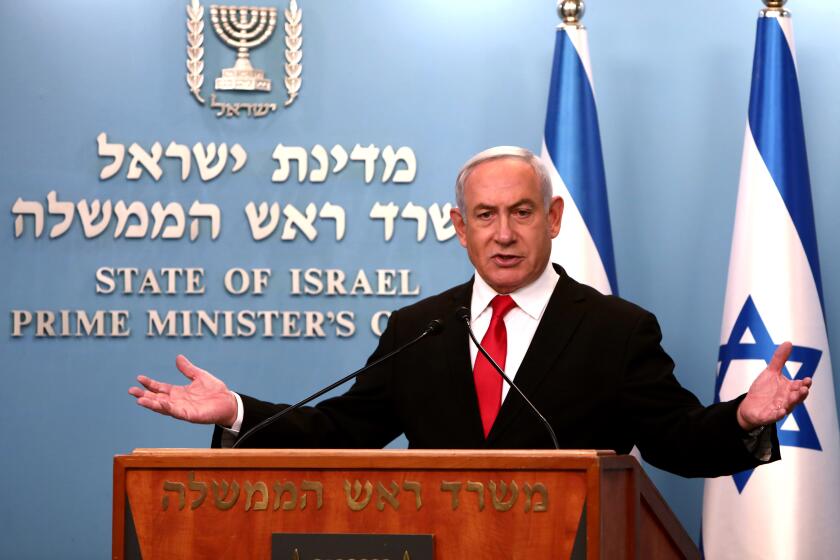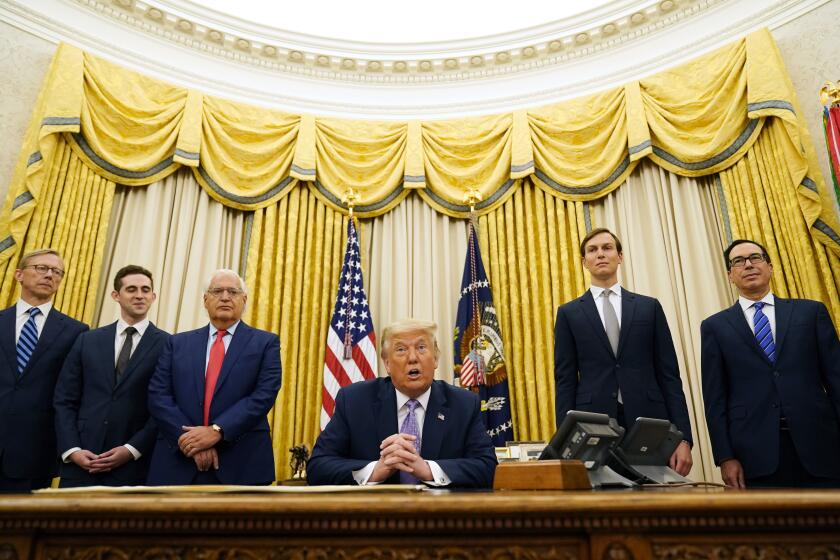Israel at 75 — still unsettled, divided and at war with itself

- Share via
When Israel celebrated its 50th anniversary, it was every bit as divided and disheartened as it is today, on the eve of its 75th.
Fifty years after its creation in 1948 as a refuge for Jews, who’d undergone two millenniums of wandering and a devastating genocidal holocaust, Israel was rich and reasonably democratic (for those it chose to enfranchise). It had revitalized a near-dead language, survived four major wars and was in the middle of a peace process with the Palestinians.
Yet its achievements seemed distant, its ideals battered, and it was a land of “unfulfilled dreams in the grips of a bruising internal struggle.”
Opinion Columnist
Nicholas Goldberg
Nicholas Goldberg served 11 years as editor of the editorial page and is a former editor of the Op-Ed page and Sunday Opinion section.
That’s what I wrote 25 years ago, in 1998, as a Jerusalem-based correspondent covering the 50th anniversary. It has surprised me, in rereading it, how fraught and similar the situation is today.
Israel marked its 50 years of existence with symphonies, dance performances, parades, a flotilla and a concert of cantors, but the country was adrift, the peace process was stumbling and Israelis were still reeling from the assassination of Prime Minister Yitzhak Rabin three years earlier at, of all things, a peace rally. Left and right were at daggers, as were religious and secular Jews. The conflict with the Palestinians raged on — West Bank settlements, terrorist attacks, mutual recriminations and growing distrust. Increasingly empty promises of peace.
Abba Eban, former Israeli foreign minister, told me then: “I worry very much about my country these days. It’s very sharply divided, it’s disappointing and there’s a sense of disillusionment.”
The U.S. is so far empty-handed in dealing with Israel’s radical government and dysfunctional Palestinian leadership.
Now, 25 years later, Israel is again tense and riven. On its 75th anniversary, left and right are again at war, as are religious and secular. Again, people are flooding the streets in protest.
Though I never would have believed it in 1998, the unjust occupation of Palestinian land seized in the Six-Day War in 1967 continues. Palestinian hopes for independence remain unfulfilled; violence persists; Israeli settlements continue to spread. The occupation has lasted for 56 years, and the conflict seems no closer to resolution.
Fewer and fewer people believe a two-state solution, which seemed inevitable in the 1990s, will spring miraculously back to life.
Israel today faces stiff critiques around the world, including in the U.S.
Here, it receives more support than it used to from evangelical Christians, but less from American Jews — and more from Republicans than Democrats. According to Gallup, Democrats now sympathize more with Palestinians than with Israel, a stunning shift from 2001, when they favored Israel by about 35 points.
The collapse of the two-state solution and the threat to democracy from a new governing coalition have made Israel unrecognizable now.
The Abraham Accords, a set of normalization agreements with several Arab states forged during the Trump administration, have taken some of the international pressure off Israel to find a solution to the Palestinian conflict. But the underlying issue isn’t going away, and more violence seems inevitable, the predictable result of an occupation that festers and chafes.
At the 50th anniversary, I wrote about the challenges to Israeli national myth-making as the country matured into adulthood. The country’s founder David Ben-Gurion was getting a critical rethink; “new historians” were seeking to debunk what they called a distorted “Zionist narrative” of Israeli history. One such story claimed that hundreds of thousands of Palestinians fled the country in 1948 voluntarily or at the behest of their leaders — rather than that they’d been pushed out by Israeli soldiers.
Israel’s collectivist idealism, too, seemed threatened in 1998. Children born on kibbutzim weren’t staying on when they grew up. Socialism was a thing of the past. The Histadrut, the nation’s powerful labor union, was losing influence.
During much of the intervening 25 years, the country has been led by the right-wing leader of the Likud Party, Benjamin Netanyahu, now the country’s longest-serving prime minister. Netanyahu is serving his sixth term even as he’s being tried on bribery and fraud charges.
The United Arab Emirates and Israel will work toward normalizing ties in a deal that halts Israel’s annexation of land claimed by Palestinians.
For much of his tenure, Netanyahu has presided over a country with a booming high-tech economy, which helps explain his continued electoral success. But the government he leads today is more illiberal and reactionary than ever.
Netanyahu’s coalition includes several ultranationalist ministers, including Finance Minister Bezalel Smotrich, who believes the occupied territories were promised to the Jews by God, and National Security Minister Itamar Ben-Gvir, who was convicted of “racist” incitement and barred from serving in the army because of his extremism.
For the 50th anniversary, I interviewed Netanyahu, who was then 48 years old and in his first term. He shrugged off the notion that internal dissension was leaving the country battered.
“This is so boring, so untrue,” he said. “We’re celebrating an enormous triumph. Let those who carp do so on the sidelines. They’re just a footnote in this great odyssey.”
Israel’s longest-serving prime minister is out of tricks. His attempt at a judicial revolution has left Israelis feeling disenfranchised and desperate.
He’s done much to make that final statement come true, outperforming opponents in repeated elections by focusing on fears about security. For years now it’s been said that the Israeli left and the Israeli peace movement are dead, or virtually so. The Labor Party, which dominated the country for most of its first 50 years, now holds only four out of the 120 seats in the Knesset, suggesting it has become a footnote indeed.
But once again, Israel is at a transitional moment. Will it continue its descent into reactionary politics? A poll conducted in early April found that just 20% of Israelis believe Netanyahu is doing a good job.
The streets today are full of newly energized Israelis protesting the government’s hard-right agenda. Tens of thousands of people — sometimes more than 100,000 — have turned out around the country each week to repudiate the government’s plan for so-called judicial reform and other policies that threaten democracy. The demonstrations have continued for 16 straight weeks.
Thousands of military reservists have threatened not to report for duty if the judicial reform is passed.
Here’s hoping the right has finally overplayed its hand.
More to Read
A cure for the common opinion
Get thought-provoking perspectives with our weekly newsletter.
You may occasionally receive promotional content from the Los Angeles Times.















